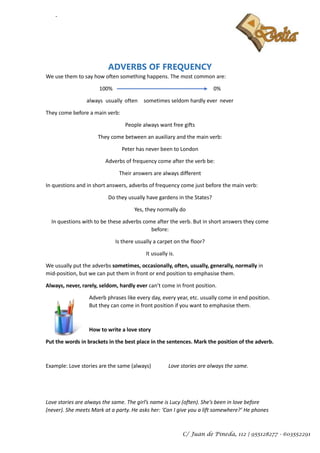
Adverbs of Frequency Guide
- 1. - ADVERBS OF FREQUENCY We use them to say how often something happens. The most common are: 100% 0% always usually often sometimes seldom hardly ever never They come before a main verb: People always want free gifts They come between an auxiliary and the main verb: Peter has never been to London Adverbs of frequency come after the verb be: Their answers are always different In questions and in short answers, adverbs of frequency come just before the main verb: Do they usually have gardens in the States? Yes, they normally do In questions with to be these adverbs come after the verb. But in short answers they come before: Is there usually a carpet on the floor? It usually is. We usually put the adverbs sometimes, occasionally, often, usually, generally, normally in mid-position, but we can put them in front or end position to emphasise them. Always, never, rarely, seldom, hardly ever can’t come in front position. Adverb phrases like every day, every year, etc. usually come in end position. But they can come in front position if you want to emphasise them. How to write a love story Put the words in brackets in the best place in the sentences. Mark the position of the adverb. Example: Love stories are the same (always) Love stories are always the same. Love stories are always the same. The girl’s name is Lucy (often). She’s been in love before (never). She meets Mark at a party. He asks her: ‘Can I give you a lift somewhere?’ He phones C/ Juan de Pineda, 112 | 955128277 - 603552291
- 2. her the next day. After that they are apart (hardly ever). But then another woman appears (always). She’s very attractive (usually). And her name’s Miranda (generally). Lucy sees them together in town. She phones him later at his flat. He isn’t there. She tries again. She can’t believe (really) that it’s all finished. She locks herself in her room. At first she’s terribly unhappy. But then Mark realizes that he doesn’t really love Miranda. And he returns to Lucy forever. Instructions: Insert an adverb of frequency into each sentence. Choose from always, almost always, usually, often, sometimes, seldom, rarely, almost never or never. Example: My father often goes on business trips. 1. Our teacher teaches on Tuesday. 2. Our teacher goes swimming at the university pool. 4. Our teacher gives homework for the weekend. 5. Our teacher brings food into class. 6. Our teacher is impatient with students who don't pay attention. 7. Our teacher loses patience when students don't understand. 8. Our teacher is energetic in class. 9. Our teacher tells funny stories. 11. Our teacher gives exercise pages to students. 12. Our teacher wears jeans to class. 15. I am late for class. 17. Our teacher is in class before six o'clock. 18. I don't want to do the homework. 19. I go on trips on the weekend. 20. My classmates are interested in what the teacher says. 21. I buy lottery tickets. 22. I am tired at the end of class. 24. My street is noisy. 25. I give money to people who beg on the street.
